

The link below will send you to our secure donation servers at https://secure.actblue.com.
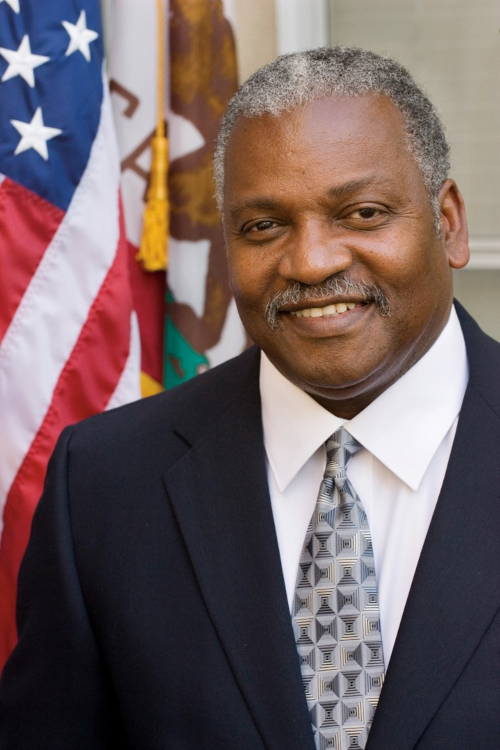
OUR COMMUNITY has a rich history of progressive politics and electing great community leaders that put the interest of the public first. As an Assemblymember, Sandré R. Swanson has been a champion for social and economic justice. His record of service to our community has helped the East Bay remain the progressive conscience of California.
As a young activist, Sandré worked for Congresswoman Shirley Chisholm’s Presidential Campaign in California. This was his introduction to the campaign experience. As a result of joining this historic campaign, Sandré met another young activist — Barbara Lee. They became and remain lifelong friends.
Before Sandré was elected to represent the cities of Oakland, Alameda and Piedmont in the California Assembly, he served five years as Chief of Staff for Congresswoman Barbara Lee. Sandré started his government service as an entry‐level Legislative Aide, promoted to District Director and Senior Policy Advisor for Congressman Ronald V. Dellums during his 25 years of service. Following his terms in the California Legislature, Sandré served as Deputy Mayor for the City of Oakland during the administration of Mayor Jean Quan. He has held a number of civic and community leadership positions. Sandré served as Chair of the Alameda County Employee’s Retirement Association, ACERA; Chair of the Oakland Civil Service Commission; Chair of the Oakland Re‐Use and Redevelopment Authority; Vice Chair of the City of Alameda Re‐Authority; and Chair of the City of Alameda Golf Commission.
Of all of his community experience, Sandré has stated that his most enjoyable and exciting assignment was serving as the coordinator for Nelson Mandela’s historic visit to Oakland. He organized the celebration that brough 60,000 people to the Oakland Coliseum in 1990 to welcome Mr. Mandela following his release from a South African prison.
Sandré was born in Oakland California at Highland Hospital. Sandré and his wife Anita live in Oakland and have four adult children, five grandchildren and two great grandchildren.

The Presidential Primary Election is on Tuesday, March 5, 2024.
Join Our Winning Campaign for the 7th District of the California State Senate.
California 7th Senate District Includes the cities of Oakland, Alameda, Piedmont, Emeryville, Berkeley, Albany, El Cerrito, Richmond, East Richmond Heights, San Pablo, El Sobrante, Tara Hills, Pinole, Rodeo and Hercules.
Swanson for State Senate 2024, c/o River City Business Services, 5445 Madison Avenue, Sacramento CA 95841
Paid for by Swanson for State Senate 2024. FPPC # 1459088
As Chair of the Labor and Employment Committee, Sandré never compromised his principles during the hard fights, as he sponsored laws that improved the quality of life in our community. Sandré sponsored laws for workplace safety and wage protection. He led efforts to protect your pensions and retirement security. He has always supported our ongoing equal pay for equal work campaign. For these reasons, working families are joining our campaign.
Sandré is passionate about the plight of troubled and at-risk youth. As Chair of the Assembly Select Committee on the Status of Boys and Men of Color, his committee’s work is still widely used today by the State in its strategies for assisting young people. As a result of this work, in 2014 Sandré was invited to the White House by President Barack Obama and was requested to participate in the President’s "My Brothers Keepers" initiatives.
As a Member of the Assembly Budget Committee on Education Finance, Sandré worked hard to make education California’s top budgetary priority. Keeping his promise, his first bill on his very first day in the Assembly was to return local control of Oakland schools from State control to the parents, teachers and students of Oakland. Our students continue to need our support.
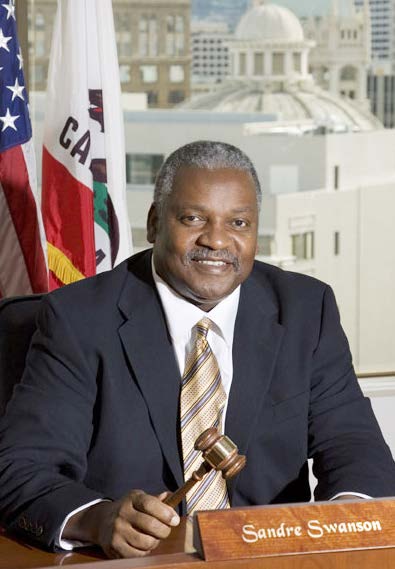
As a Member of the Budget Committee, Sandré was a consistent voice for more funding for our State colleges. He remains committed to free community college and real student loan debt relief.
During California’s budget debates, Sandré was at times the lone voice in the fight against the suspensions of Proposition 98 guarantees for school and classroom funding.
As an Assemblymember, Sandré R. Swanson was a leader in the fight to keep redevelopment programs for affordable and Senior housing. He told his colleagues in real time that "the elimination of redevelopment funds would lead to more homelessness and a growing housing crisis of affordability."
Homeless encampments are growing daily. We are losing control of our streets with an increasing environmental hazard of trash and waste. We no longer provide safe city parks for our children. Now a criminal element is victimizing the unhoused, particularly women and children. This violence is spreading to the general population and must stop.
History has shown Sandré’s hard‐fought opposition to the elimination of redevelopment funds were right and we need him now in the Senate to help us fix our current housing and homeless crisis. Sandré said, "solving the homeless problem is California’s moral imperative and I will lead a humanitarian effort to fix this as your State Senator."
Sandré has also sponsored laws to reduce neighborhood crime for the safety of our children and entire community. His Assembly office maintained the best Constituent Service in the East Bay for those in need of help with the State bureaucracy. Sandré led the fight to keep the "Healthy Family Program" that provided healthcare for 740,000 poor children, supported community clinics and was a champion for accessible and quality health care for all the people of our State.
Sandré sponsored legislation for a healthy and safe environment while working for sustainable jobs with a living wage. He conducted hearings at the Port of Oakland on reducing truck emission to protect children and seniors with asthma and to reduce the greenhouse gas footprint. Sandré has made it possible for qualifying homeowners in his district to make affordable seismic safety upgrades to their homes for protection before the next large earthquake.
Sandré was a leading voice in the legislature with the "Stop The Spray" movement protecting our children from pesticide spraying near schools. He sponsored laws to stop illegal dumping and supported green jobs. Sandré has worked over a number of years on conservation for our bay and supported efforts to rebuild California’s wetlands.
Sandré led the State’s efforts to rescue our children from Human Traffickers — some children as young as 12 years old and he increased funding for wrap‐around services for our most at risk‐youth. During the budget battles of the recession, he challenged those in leadership, who demanded we gut the social safety net for the poor, the disabled, seniors and children. Sandré stood up against their threats and fought to protect this important funding.
He supported small business loans in underserved communities to increase employment opportunities and has been an advocate for Equal Rights and Civil Rights for everyone.
Assemblymember Sandré R. Swanson’s record of hard work for the people of our district is clear. Here are some of his very important legislative accomplishments and his bills that are now California law.
This bill will change the treatment of underage prostitutes from criminals to victims of sexual exploitation, and implement a pilot program to increase coordination between government, law enforcement and child advocates, thereby helping Sexually Exploited Minors escape the cycle of abuse and exploitation.
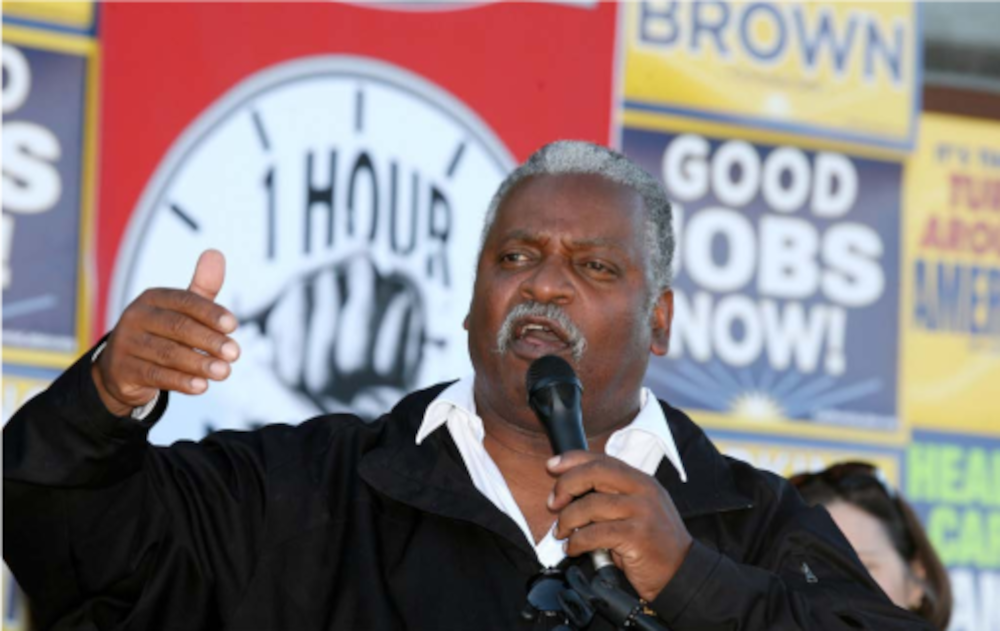
Signed by Governor Schwarzenegger on September 27 Chaptered by Secretary of State — Chapter 359, Statutes of 2008.
Increases up to $20,000 the fine against a person convicted of pimping, pandering, or procurement of a minor and directs half of these funds to community‐based organizations that serve underage victims of sexual exploitation and human trafficking. AB 17 would also categorize these crimes as "criminal profiteering activity," which could force those convicted of human trafficking to forfeit assets connected to those crimes.
The Human Trafficking Accountability Act would take an important step in recognizing that the fight to end the commercial sexual exploitation of children must start with increasing penalties against the "Johns" that keep this ugly, clandestine business alive.
Signed by Governor Schwarzenegger on October 11 Chaptered by Secretary of State — Chapter 211, Statutes of 2009.
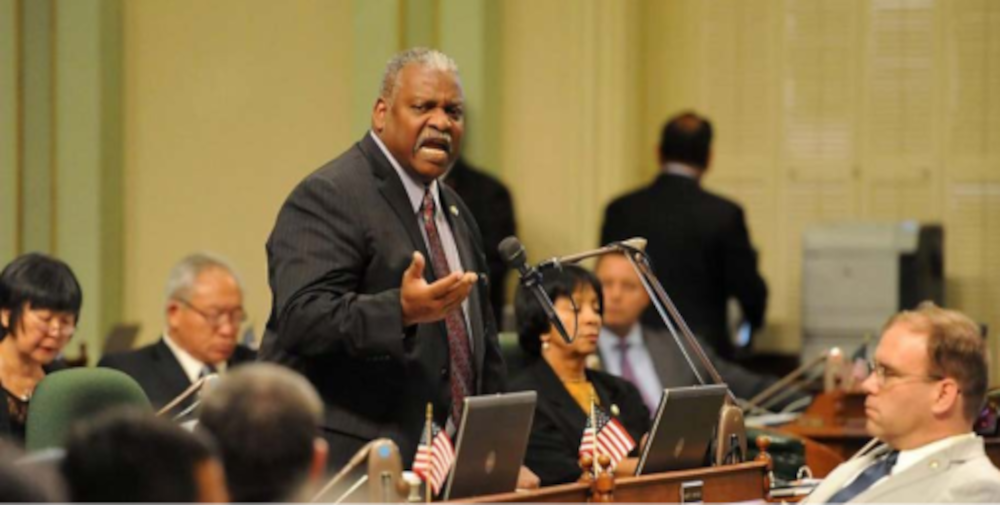
AB 90 expands the types of human trafficking crimes subject to criminal profiteering asset forfeiture laws. Specifically, it provides that any case in which the defendant persuaded, induced, coerced or forced a minor to engage in a commercial sex act can be the basis of criminal profiteering asset forfeiture. AB 90 recognizes psychological coercion within the context of asset forfeiture, and makes the resulting funds available for minor victims of human trafficking through the Victim‐Witness Assistance Fund.
Signed by Governor Brown on October 4 Chaptered by Secretary of State — Chapter 457, Statutes of 2011.
The commercial exploitation of minors is exploding in low-income communities and communities of color. The Abolition of Child Commerce, Exploitation, and Sexual Slavery Act (ACCESS Act) increases the fine to a maximum of $25,000 against a person procuring a minor for sex and directs those fines to organizations that help victims transition to a healthy and safe lifestyle.
Signed by Governor Brown on July 11. Chaptered by Secretary of State — Chapter 75, Statutes of 2011.
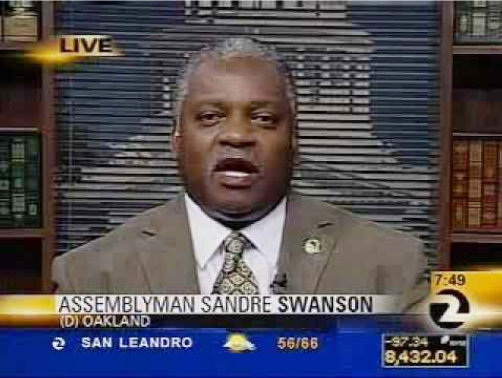
AB 764 would add a new donation box to the state income tax form that would allow taxpayers to voluntarily donate to programs that provide assistance to child victims of commercial sexual exploitation. Young trafficking victims suffer from significant physical and mental health problems, including post‐traumatic stress disorder, depression, and trauma bonding, resulting from displacement and abuse. AB 764 will help fund programs providing vital support services.
Signed by Governor Brown on October 4. Chaptered by Secretary of State — Chapter 465, Statutes of 2011.
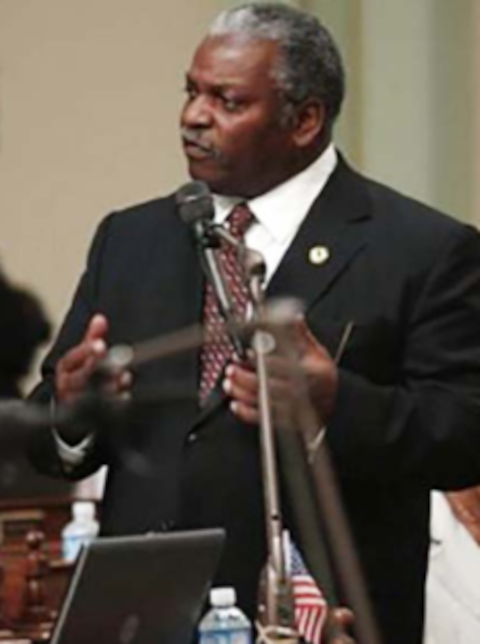
AB 799 extended and expanded a successful diversion program for commercially sexually exploited minors in Alameda County. Rather than cycling child "prostitutes" through the criminal justice system, the program provides law enforcement with tools to identify exploited minors and provide them with extensive wrap‐around services to address their physical and mental health needs.
Signed by Governor Brown on June 29, 2011 ‐ July 1, 2011. Chaptered by Secretary of State — Chapter 51, Statutes of 2011.
The BART Accountability Act authorizes BART to establish a Citizens Review Board and an Office of Independent Police Auditor to investigate complaints of misconduct filed by members of the public against BART police officers. This Act is a result of months of negotiations with community leaders and the BART board following the tragic killing of young Oscar Grant, III by a BART police officer on New Year’s Day 2009. AB 1586 has been critical in rebuilding community confidence in BART and its officers.

Assemblymember Swanson’s bill is the first Citizen Review Board and independent Police Auditor process in our State for a mass transit system.
Signed by Governor Schwarzenegger on July 15. Chaptered by Secretary of State — Chapter 78, Statutes of 2009.

This resolution urges the Air Resources Board to meet the statutory requirements of the California Global Warming Solutions Act of 2006 by ensuring that its analysis of specified emission reduction measures include prescribed components.
Resolved by the Assembly of the State of California, the Senate thereof concurring, that the Legislature of California joins California’s workers and their families in urging the State Air Resources Board to meet the statutory requirements of the act for the preparation of the best available economic analysis by ensuring that its analysis of the emission reduction measures as proposed in the scoping plan and related rulemaking includes the following:
Signed by Governor Schwarzenegger on September 23. Chaptered by Secretary of State — Chapter 109, Statutes of 2009.
Many students in the Peralta Community College District depend on public transit to get from work to class to home. This bill will allow the Peralta Community College District to approve a low fee on the entire student body to fund low‐cost bus and BART passes that could save students up to $1,300 per year and increase the use of public transportation.
Signed by Governor Schwarzenegger on July 18. Chaptered by Secretary of State — Chapter 145, Statutes of 2008.
Seismic Safety is a serious ongoing concern in California. Studies show that 26,000 of the 163,000 housing units in Oakland would be left uninhabitable after the next large earthquake if seismic safety upgrades were not installed. AB 184 provides a financing option to homeowners who wish to make seismic improvements to their homes, removing much of the upfront expense.
Signed by Governor Brown on June 18. Chaptered by Secretary of State on June 20 — Chapter 28, Statutes of 2011.
AB 801, Illegal dumping enforcement officers and code enforcement officers. An act to amend Section 830.7 of the Penal Code, relating to law enforcement officers. Existing law defines "code enforcement officer" to mean specified persons employed by any governmental subdivision, public or quasi‐public corporation, public agency, public service corporation, any town, city, county, or municipal corporation, whether incorporated or chartered, who have enforcement authority for health, safety, and welfare requirements, and whose duties include enforcement of any statute, rules, regulations, or standards, and who are authorized to issue citations, or file formal complaints. The term also refers to any person who is employed by the Department of Housing and Community Development who has enforcement authority for health, safety, and welfare requirements relating to housing, as specified.
Signed by Governor Brown September 13, 2012. Chaptered by Secretary of State — Chapter 298, Statutes of 2012.

Worker Safety AB 1136 requires general acute care hospitals to maintain trained lift teams to handle patient lifts, repositioning, and transfers. The bill protects workers from disciplinary action if they choose not to lift a patient because of safety concerns. AB 1136 also provides hospitals with flexibility to establish safe patient policies reflective of their unique needs and allows hospitals to train existing staff as lift team members to avoid the cost of hiring new employees.
Over 12 percent of the nursing workforce leaves the occupation each year due to back injuries. California’s nursing workforce is aging at the same time patient acuity and obesity is rising. It is imperative that we protect our registered nurses and other health care workers from injury, and provide patients with safe and appropriate care.
Signed by Governor Brown on October 7. Chaptered by Secretary of State — Chapter 554, Statutes of 2011.
AB 410 requires state departments and agencies that issue regulations particularly relevant to the blind and visually impaired to provide the regulations in a format that can be accurately interpreted by the reading software used by the blind and visually impaired. Blind and visually impaired persons are blocked from participating in the democratic process because the reading software they use is unable to interpret the regulations that departments make available to the public. AB 410 empowers persons who are blind or who have severely impaired vision to, like their sighted counterparts, participate in the regulation process.
Signed by Governor Brown on October 5. Chaptered by Secretary of State — on October 6 Chapter 495, Statutes of 2011.
This measure would encourage the State to ensure that the In‐Home Supportive Services (IHSS) Plus Waiver is renewed and protected, preserving the continuum of care that thousands of aged, blind, and disabled Californians depend on every day to sustain their independence and maintain their dignity.
Signed by Governor Schwarzenegger on August 29. Chaptered by Secretary of State — Chapter 108, Statutes of 2008.
ACR ‐ 99 urges school districts to take the necessary steps to increase school nurse salaries to a level comparable to those received by nurses employed in hospitals and clinics. Such nurses make on average about $20,000 more per year than their counterparts working in schools.
Signed by Governor Schwarzenegger on July 23. Chaptered by Secretary of State — Chapter 93, Statutes of 2008.
This resolution urges the President of the United States, the United States Congress, and the United States Secretary of Health and Human Services to take specified actions in regard to health disparities, particularly as they relate to HIV/AIDS funding.
Signed by Governor Schwarzenegger on October 11. Chaptered by Secretary of State — Chapter 211, Statutes of 2009.
AB 1357 increases voter registration opportunities by authorizing counties to provide voter registration forms on their government websites. The online federal form currently provided by the Secretary of State is missing critical information that is required under California law, including place of birth and the permanent vote by mail request box. AB 1357 strengthens the registration process by reducing unnecessary burdens on county election officials and expanding public access to voter registration.
Signed by Governor Brown on August 8. Chaptered by Secretary of State — Chapter 192, Statutes of 2011.
AB 1440 ensures the integrity of California’s democratic process during a Governor’s declared state of emergency. AB 1440 would require county election officials to issue provisional ballots to fire fighters, police officers, and other emergency personnel whose duties require them to be outside of their home county on Election Day. The fundamental right to vote should never be compromised by an emergency responder’’s call to duty.
Signed by Governor Schwarzenegger on October 11 Chaptered by Secretary of State — Chapter 395, Statutes of 2009.
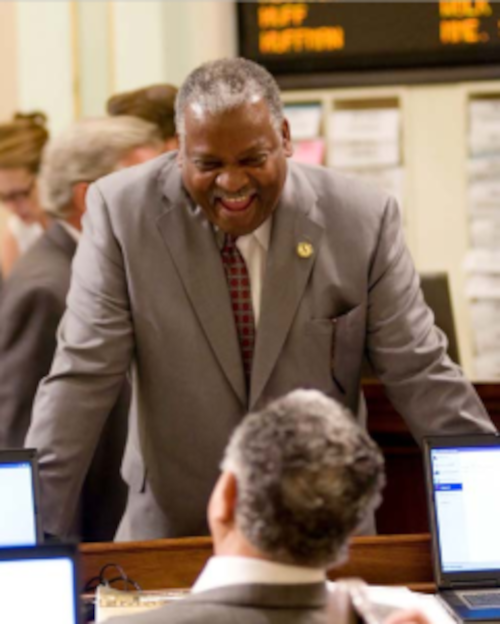
AB 216, Swanson. Voters: residency confirmation. Amending Election Code. Existing law requires the county elections official to conduct a preelection residence confirmation procedure by mailing a specified non‐forwardable postcard to each registered voter of the county by the 90th day immediately prior to the direct primary election. This bill would permit a county elections official, in lieu of mailing a residency confirmation postcard, to contract with a consumer credit reporting agency or its licensees to obtain change‐of‐address data. If the county elections official contracts with a consumer credit reporting agency or its licensees, this bill would require the county elections official, based on the change‐of‐address information received, to send a specified forwardable notice to the registered voter to enable the voter to verify or correct the address information. If the voter responds to the forwardable notice, or otherwise verifies in writing his or her new residence address, this bill would require the county elections official, as appropriate, to correct or cancel the voter’s registration.
Signed by Governor Brown September 24, 2012. Chaptered by Secretary of State — Chapter 495, Statutes of 2012.
AB 469 established new misdemeanor penalties for employers who steal worker wages. The bill also requires employers to provide workers, at the time of hire, with a written disclosure of basic terms of employment, such as rate and date of pay. Recent studies show that $26.2 million per week is stolen from an estimated 650,000 low‐wage workers in Los Angeles as a result of employment and labor law violations. AB 469 punishes employers who foster the underground economy.
Signed by Governor Brown on October 9. Chaptered by Secretary of State — Chapter 655, Statutes of 2011.
Waste, fraud, and abuse cost local governments an estimated 7 percent of their budgets each year. AB 1666 permits local government, auditors, and controllers to establish and maintain a whistleblower hotline to receive calls from persons who have information regarding waste, fraud, or abuse.
Signed by Governor Schwarzenegger on July 15. Chaptered by Secretary of State — Chapter 80, Statutes of 2009.

AB 1396 requires all employers who have employees performing services in California involving "pay on a commission basis" put the commission agreement in a writing that sets forth how commissions will be computed and paid. The employer must give a signed copy of the contract to the employee and retain the employee’s signed receipt of the contract. In the event the contract by its terms expires but the parties nevertheless continue to work under the expired contract, its terms are presumed to remain in full force and effect until the contract is expressly superseded by a new contract or the employment relationship is terminated.
Signed by Governor Brown on October 7. Chaptered by Secretary of State — Chapter 556, Statutes of 2011.
Extends the sunset date on the Carwash Worker Law, the statutory enforcement program regulating the employment practices of car washes, until 2014. AB 236 would require all carwashes to register with the state, purchase surety bonds as wage insurance, and contribute to the "Carwash Worker Restitution Fund." AB 236 holds carwash business owners accountable and protects their employees by providing an avenue through which unpaid wages may be collected.
Signed by Governor Schwarzenegger on October 11. Chaptered by Secretary of State — Chapter 224, Statutes of 2009.
AB 1667 will keep our streets safer by ratifying a carefully negotiated memorandum of understanding (MOU) between Alameda County and the Alameda County Deputy Sheriffs’ Association. The MOU helps the two parties implement their negotiated contracts regarding retirement formulas for safety employees.
Signed by Governor Schwarzenegger on July 15. Chaptered by Secretary of State — Chapter 81, Statutes of 2010.

Under current workplace health and safety law, California identifies and cites fewer "serious" violations than any other state or federal OSHA, an issue about which the federal government has raised major concerns. This bill, which represents a compromise solution negotiated among labor, the employer community and the administration, represents a comprehensive overhaul of how Cal/OSHA investigates and cites "serious" violations of the law. This bill will serve as landmark legislation to improve workplace health and safety and the operation of the Cal/OSHA process in general.
Signed by Governor Schwarzenegger September 30, 2010. Chaptered by Secretary of State — Chapter 692, Statutes of 2010.
Clarifies that an employer wishing to appeal a Labor Commissioner decision with the Superior Court must first post a bond in the amount of the judgment rendered in the administrative hearing.
Signed by Governor Schwarzenegger July 15, 2010. Chaptered by Secretary of State — Chapter 102, Statutes of 2010.
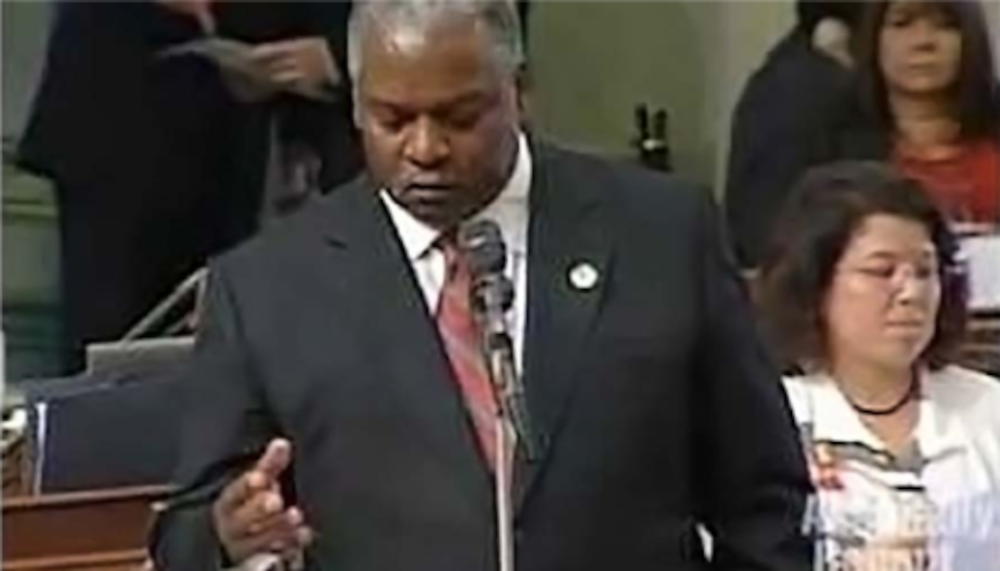
This bill encourages and supports good government by filling an important gap in whistleblower protection. It authorizes cities and counties to create and maintain whistleblower hotlines, giving employees a confidential avenue to report possible misuses of government resources.
Signed by Governor Schwarzenegger on September 26. Chaptered by Secretary of State — Chapter 325, Statutes of 2008.
The sub‐prime mortgage meltdown has lead to many people not only losing their houses, but also losing their jobs as a result of the downturn in the economy. AJR 56 urges Congress to extend Federal Unemployment benefits by at least 13 weeks for all states, and an additional 13 weeks for high unemployment states, including California.
Chaptered by Secretary of State — Chapter 83, Statutes of 2008.
This resolution calls May 2008 to be recognized as Safe Jobs for Youth Month in order to raising community awareness about child labor and workplace health and safety issues.
Chaptered by Secretary of State — Chapter 29, Statutes of 2008.
This resolution designates that Monday, January 19, 2009, be observed as the official memorial of the late Rev. Dr. Martin Luther King, Jr.’s birth and his work on the Civil Rights Movement; and commemorates the work of Dr. Martin Luther King, Jr. and the Civil Rights Movement for their help in changing public policy from segregation to integration, for the betterment of the State of California and the United States of America.
Signed by Governor Schwarzenegger on July 2. Chaptered by Secretary of State — Chapter 61, Statutes of 2008.
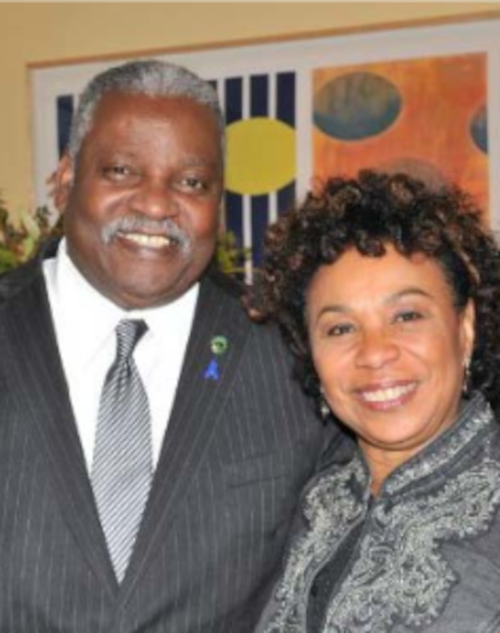
Cancer does not discriminate. This resolution encourages the private sector, State, and Federal governments to promote policies and programs to reduce cancer disparities and improve cancer prevention, detection, treatment, and follow‐up care for all Californians. Programs and policies will include educating people on the causes and types of cancer, the growing disparities in the number of cancer cases among racial groups and encouraging people to visit a doctor regularly.
Signed by Governor Schwarzenegger on May 12. Chaptered by Secretary of State — Chapter 35, Statutes of 2008.
This bill would remove the requirement that bond financing be used in order to justify the collection of a customer facility charge. It also specifies the uses of such charges to include the maintenance and operation of rental car facilities, in addition to common use transportation systems, such as rental car shuttles at the Oakland Airport.
Signed by Governor Schwarzenegger on August 1. Chaptered by Secretary of State — Chapter 228, Statutes of 2008.

The Presidential Primary Election is on Tuesday, March 5, 2024.
Join Our Winning Campaign for the 7th District of the California State Senate.
California 7th Senate District Includes the cities of Oakland, Alameda, Piedmont, Emeryville, Berkeley, Albany, El Cerrito, Richmond, East Richmond Heights, San Pablo, El Sobrante, Tara Hills, Pinole, Rodeo and Hercules.
Swanson for State Senate 2024, c/o River City Business Services, 5445 Madison Avenue, Sacramento CA 95841
Paid for by Swanson for State Senate 2024. FPPC # 1459088